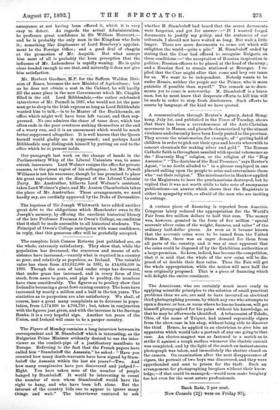The Figaro of Monday contains a long interview between its
correspondent and M. Stambuloff which is interesting, as the Bulgarian Prime Minister evidently desired to use the inter- viewer as the conduit-pipe of a justificatory manifesto to Europe. Referring to the fact that the French papers have called him "Stambuloff the Assassin," be asked : "Have you counted how many death-warrants have been signed by Stam- buloff the Assassin within the last six years P—Two. And how many conspiracies have you discovered and judgedF- Eight. You have taken note of the number of people hanged by Stambuloff. It would be interesting to count the number of men whom Stambouloff would have the right to hang, and who have been left alone. But the interest of the country bids one to appear to ignore many things and wait." The interviewer ventured to ask
whether M. Stambuloff had heard that the secret documents were forgeries, and got for answer :—" If I wanted forged documents to justify my policy, and the sentences of our tribunals, I should not have waited so long. But wait a little longer. There are more documents to come out which will enlighten the world—quite a pile." M. Stambuloff ended by stating that the Czar had offered to recognise Bulgaria on three conditions :—" the acceptation of Russian inspiration in politics ; Russian officers to be placed at the head of the army ; and a Russian fleet to remain stationed at Bourgas. I re- plied that the Czar might after that come and levy our taxes for us. We want to be independent. Nobody wants to be under Russia, neither the people nor the Prince, who is more patriotic if possible than myself." The remark as to docu- ments yet to come is noteworthy. M. Stambuloff is a brave man, bat he must know that desperate efforts to kill him will be made in order to stop fresh disclosures. Such efforts he courts by language of the kind we have quoted.


































 Previous page
Previous page